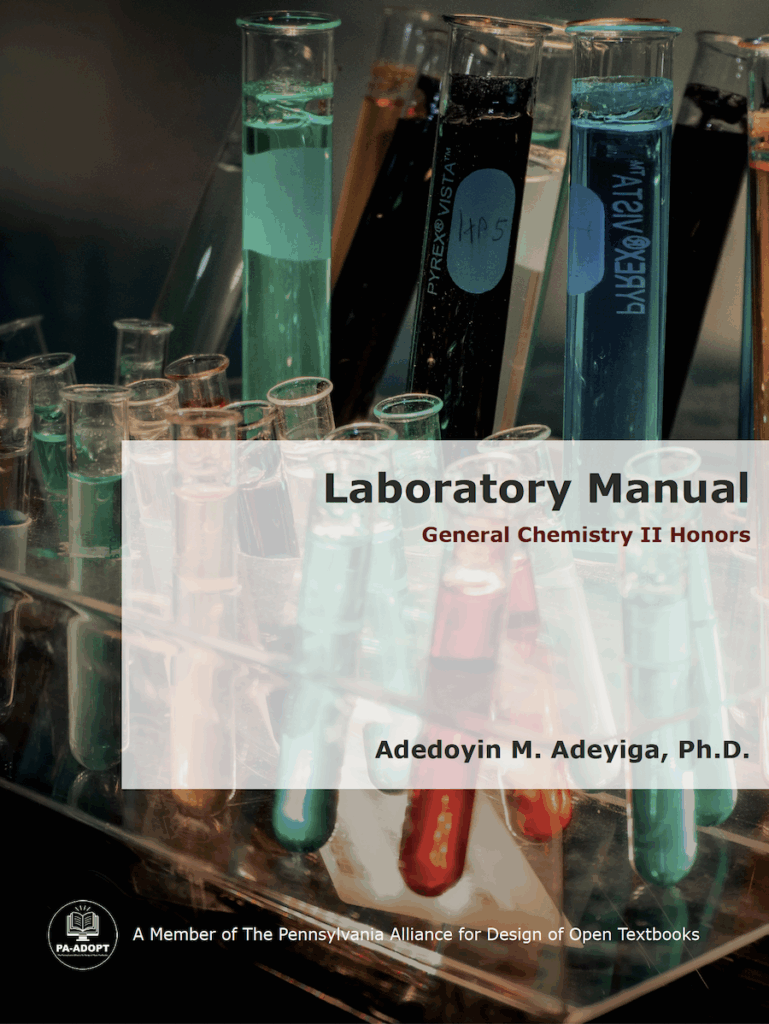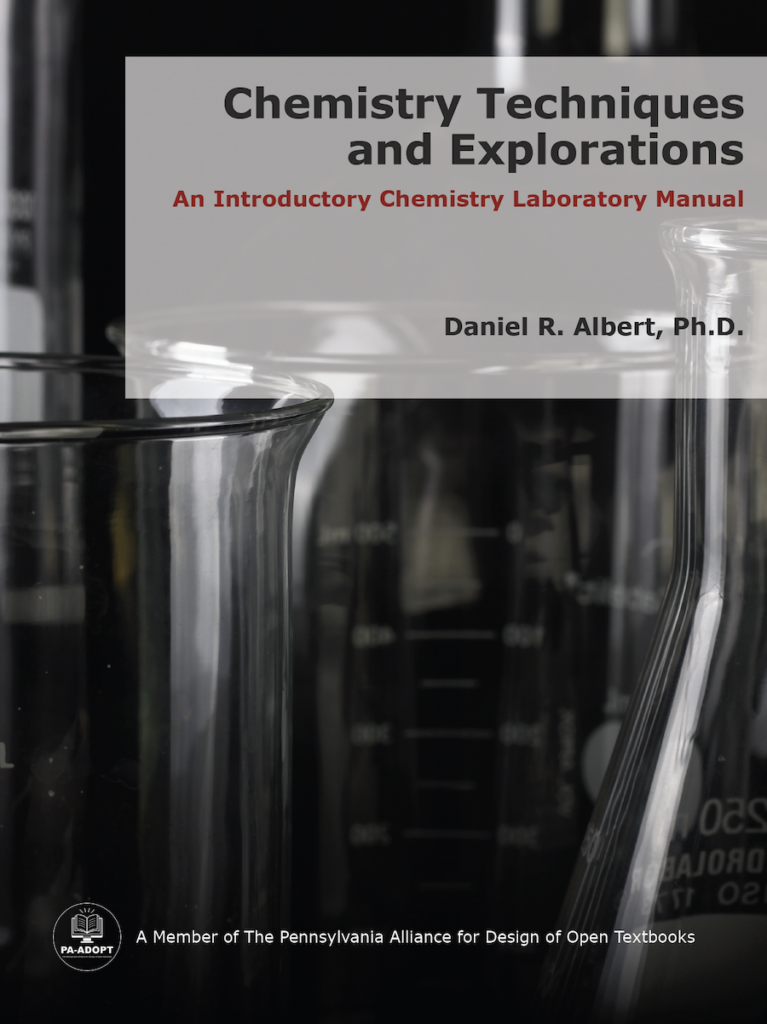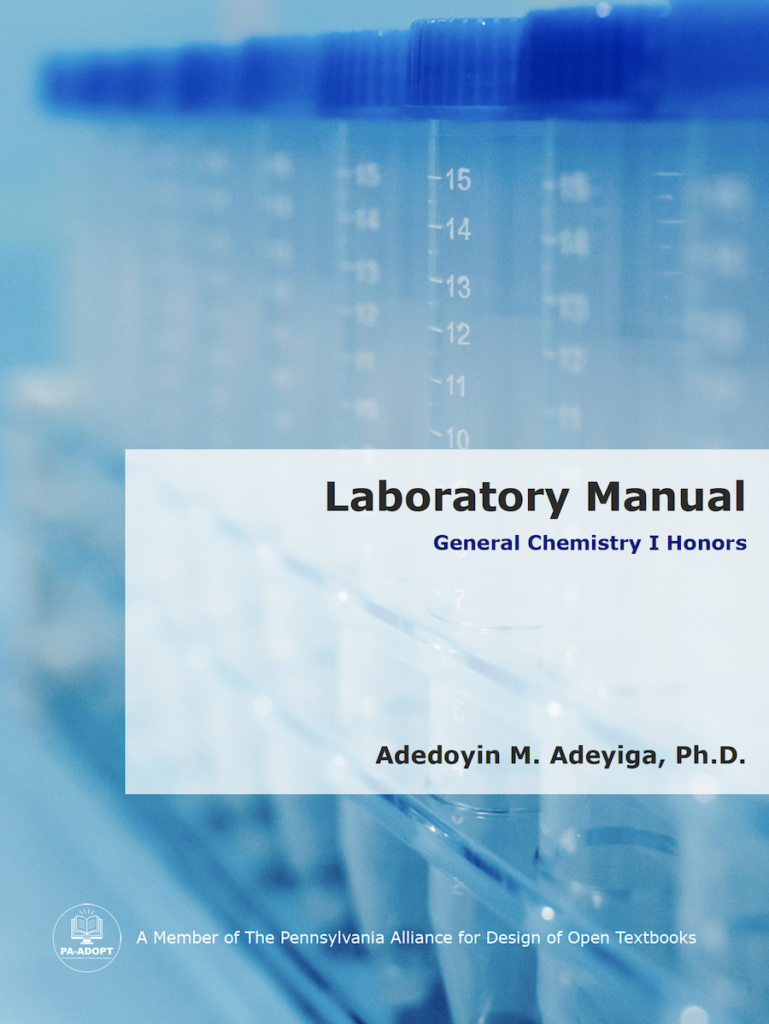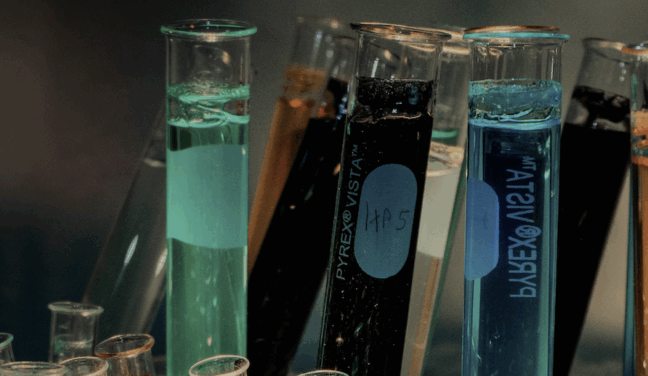
The Pennsylvania Alliance for Design of Open Textbooks (PA-ADOPT) is pleased to announce the immediate availability of our twelfth free and open eTextbook: Laboratory Manual: General Chemistry II Honors by Dr. Adedoyin M. Adeyiga, Chair of Natural and Applied Sciences & Professor of Chemistry, Department of Natural & Applied Sciences at Cheyney University.
“General Chemistry II Honors Laboratory Manual (2025) is designed to expose students to labs with applications. Chemical instrumentation for analyses of different substances is showcased; analysis of common household and environmental samples was delved into. The belief is that honors level students should get early introduction to chemical instrumentation and their use in carrying out sample testing and analysis.”
This is Dr. Adeyiga’s second eTextbook as part of the PA-ADOPT project. His first book, Laboratory Manual: General Chemistry I Honors, was released in 2023.
Please help us spread the word about our books and web site to further our work to reduce costs for students, bring equity to higher education classrooms, and give faculty the flexibility to design their own learning experiences. All of our books are available to download in both ePub and PDF formats from our Bookshelf.
Laboratory Manual: General Chemistry II Honors
by Adedoyin M. Adeyiga, Ph.D.
Keywords: Chemical Analysis, Spectroscopy, Synthesis
About the Book
General Chemistry II Honors Laboratory Manual (2025) is designed to expose students to labs with applications. Chemical instrumentation for analyses of different substances is showcased; analysis of common household and environmental samples was delved into. The belief is that honors level students should get early introduction to chemical instrumentation and their use in carrying out sample testing and analysis.
Chapters
- Preface: Calculations in the Chemistry Laboratory
- Experiment One: Chemical Spectroscopy Lab
- Experiment Two: Total Organic Carbon (TOC) Analysis of Different Bottled-Water
- Experiment Three: Total Organic Carbon (TOC) Analysis of Sugar in Carbonated and Non-Carbonated Drinks
- Experiment Four: Saponification Reaction – Making Solid and Liquid Soap
- Experiment Five: Synthesis and Analysis of Potassium Aluminum Sulfate Dodecahydrate, KAl(SO4)2.12H2O
Usage
Readers
The eTextbooks created as a part of this program are provided in two formats: ePub and PDF. Please refer to our Reader Support section for guidance on which format may be best for you and the device(s) you use.
Instructors
If you are an instructor seeking to use this eTextbook in your own course(s) please feel free to download the ePub and/or PDF file(s) for your use, but make sure to complete our eTextbook Usage Survey (this information is used for program evaluation purposes).
If you are interested in making revisions and edits to this eTextbook please note that this is possible since the book is under a Creative Commons License, which allows you to remix, reuse, revise, and redistribute the eTextbook. Please refer to the Faculty Support Page, specifically looking at Remixing. You can download Laboratory Manual: General Chemistry II Honors‘ Apple Pages File in order to use the original document to revise and remix the eTextbook for your purposes.
Citations
MLA: Adeyiga, Adedoyin. Laboratory Manual: General Chemistry II Honors. First, The Pennsylvania Alliance for Design of Open Textbooks (PA-ADOPT), 2025.
APA: Adeyiga, A. (2025). Laboratory Manual: General Chemistry II Honors. (First). The Pennsylvania Alliance for Design of Open Textbooks (PA-ADOPT).
Chicago: Adeyiga, Adedoyin. Laboratory Manual: General Chemistry II Honors. First. The Pennsylvania Alliance for Design of Open Textbooks (PA-ADOPT), 2025.
Peer Review
This eTextbook went through an Open Peer Review process. The peer review process used the Open SUNY Textbook Peer Review Guidelines, allowing peer reviewers to read the text carefully and evaluate the following:
- Educational Significance of Content including accuracy, appropriate and useful materials, valid and significant concepts, models, and skills, and key elements;
- Effectiveness as a Teaching Resource including a clear explanation of the concepts, alignment of materials to the learning process of the target audience, and alignment of the learning objectives with course goals; and
- Readability and Ease of Use including clarity and comprehensiveness, consistent writing style, readability and ease of use (logic, sequence, and flow), appropriateness for target readership level, and quality of Interactivity and multimedia learning objects.
As a part of the open peer review process, the public review conducted by Dr. Martilias Farrell is made available: Peer Review Document (PDF).
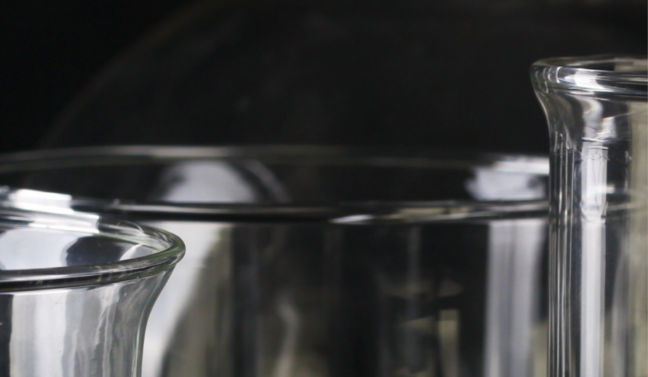
The Pennsylvania Alliance for Design of Open Textbooks (PA-ADOPT) is pleased to announce the immediate availability of our third free and open eTextbook: Chemistry Techniques and Explorations: An Introductory Chemistry Laboratory Manual by Dr. Daniel R. Albert, Associate Professor of Chemistry at Millersville University.
“Chemistry Techniques and Explorations (2023) by Dr. Daniel R. Albert is an eTextbook laboratory manual for first semester introductory chemistry courses. The manual includes two different types of experiments (Technique and Exploration) designed to engage students in chemistry laboratory practices. Technique laboratories are designed for students to learn and practice chemistry laboratory skills that are utilized in a wide variety of disciplines. Exploration laboratories provide freedom and time for students to use previously acquired skills toward answering a new application focused question. Exploration laboratories help build the scientific thinking skills necessary to approach novel problems. The goal of this lab manual is to build both fundamental techniques and problem-solving skills that aid students in becoming practicing scientists.”
Please help us spread the word about our books and web site to further our work to reduce costs for students, bring equity to higher education classrooms, and give faculty the flexibility to design their own learning experiences. All of our books are available to download in both ePub and PDF formats from our Bookshelf.
Chemistry Techniques and Explorations: An Introductory Chemistry Laboratory Manual
by Daniel R. Albert, Ph.D.
Keywords: Lab Manual, Chemistry
About the Book
Chemistry Techniques and Explorations (2023) by Dr. Daniel R. Albert is an eTextbook laboratory manual for first semester introductory chemistry courses. The manual includes two different types of experiments (Technique and Exploration) designed to engage students in chemistry laboratory practices. Technique laboratories are designed for students to learn and practice chemistry laboratory skills that are utilized in a wide variety of disciplines. Exploration laboratories provide freedom and time for students to use previously acquired skills toward answering a new application focused question. Exploration laboratories help build the scientific thinking skills necessary to approach novel problems. The goal of this lab manual is to build both fundamental techniques and problem-solving skills that aid students in becoming practicing scientists.
Chapters
- Safety and Record Keeping
- Separating Substances, Measuring Mass, and Analyzing Data – Technique Laboratory
- Measuring Volumes – Technique Laboratory
- Reaction Types and Qualitative Analysis – Technique Laboratory
- What is Contaminating the Water Supply? – Exploration Laboratory
- Titrations Technique Laboratory
- What is the Acidity of Vinegar? – Exploration Laboratory
- Absorption Spectroscopy Technique Laboratory
- What is the Dye Composition of a Drink?-Exploration Laboratory
Usage
Readers
The eTextbooks created as a part of this program are provided in two formats: ePub and PDF. Please refer to our Reader Support section for guidance on which format may be best for you and the device(s) you use.
Instructors
If you are an instructor seeking to use this eTextbook in your own course(s) please feel free to download the ePub and/or PDF file(s) for your use, but make sure to complete our eTextbook Usage Survey (this information is used for program evaluation purposes).
If you are interested in making revisions and edits to this eTextbook please note that this is possible since the book is under a Creative Commons License, which allows you to remix, reuse, revise, and redistribute the eTextbook. Please refer to the Faculty Support Page, specifically looking at Remixing. You can download Chemistry Techniques and Explorations An Introductory Chemistry Laboratory Manual Apple Pages File in order to use the original document to revise and remix the eTextbook for your purposes.
Citations
MLA: Albert, Daniel. Chemistry Techniques and Explorations An Introductory Chemistry Laboratory Manual. First, The Pennsylvania Alliance for Design of Open Textbooks (PA-ADOPT), 2023.
APA: Albert, D. (2023). Chemistry Techniques and Explorations An Introductory Chemistry Laboratory Manual. (First). The Pennsylvania Alliance for Design of Open Textbooks (PA-ADOPT).
Chicago: Albert, Daniel. Chemistry Techniques and Explorations An Introductory Chemistry Laboratory Manual. First. The Pennsylvania Alliance for Design of Open Textbooks (PA-ADOPT), 2023.
Peer Review
This eTextbook went through an Open Peer Review process. The peer review process used the Open SUNY Textbook Peer Review Guidelines, allowing peer reviewers to read the text carefully and evaluate the following:
- Educational Significance of Content including accuracy, appropriate and useful materials, valid and significant concepts, models, and skills, and key elements;
- Effectiveness as a Teaching Resource including a clear explanation of the concepts, alignment of materials to the learning process of the target audience, and alignment of the learning objectives with course goals; and
- Readability and Ease of Use including clarity and comprehensiveness, consistent writing style, readability and ease of use (logic, sequence, and flow), appropriateness for target readership level, and quality of Interactivity and multimedia learning objects.
As a part of the open peer review process, the public review conducted by Dr. Ed Rajaseelan is made available: Peer Review Document (PDF).
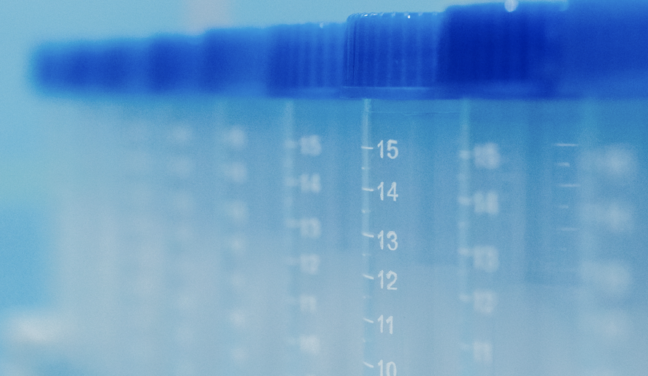
First eTextbook now available!
The Pennsylvania Alliance for Design of Open Textbooks (PA-ADOPT) is pleased to announce the immediate availability of our first free and open eTextbook: Laboratory Manual: General Chemistry I Honors by Adedoyin M. Adeyiga, Ph.D., Chair of Natural and Applied Sciences & Professor of Chemistry, Department of Natural & Applied Sciences at Cheyney University.
“General Chemistry I Honors Laboratory Manual (2023) is an eTextbook designed to provide a practical, hands-on approach to learning chemistry for students taking General Chemistry I Honors courses. The manual covers fundamental principles of chemistry, including atomic structure, chemical bonding, stoichiometry, gas laws, and thermodynamics. The book is divided into chapters, each focusing on a specific topic. Each experiment in the manual is accompanied by step-by-step instructions, pre-lab questions, and post-lab questions, helping students to develop their analytical and problem-solving skills.”
Please help us spread the word about our books and web site to further our work to reduce costs for students, bring equity to higher education classrooms, and give faculty the flexibility to design their own learning experiences. All of our books are available to download in both ePub and PDF formats from our Bookshelf.
Laboratory Manual: General Chemistry I Honors
by Adedoyin M. Adeyiga, Ph.D.
Keywords: Lab Manual, Chemistry
About the Book
General Chemistry I Honors Laboratory Manual (2023) is an eTextbook designed to provide a practical, hands-on approach to learning chemistry for students taking General Chemistry I Honors courses. The manual covers fundamental principles of chemistry, including atomic structure, chemical bonding, stoichiometry, gas laws, and thermodynamics. The book is divided into chapters, each focusing on a specific topic. Each experiment in the manual is accompanied by step-by-step instructions, pre-lab questions, and post-lab questions, helping students to develop their analytical and problem-solving skills.
Chapters
- Calculations in the Chemistry Laboratory
- Experiment One: Which Antacid is Most Effective?
- Experiment Two: Extraction of Fat and Determination of Fat Content of Candy Bars
- Experiment Three: Identifying Some Constituents of Bones
- Experiment Four: Synthesis of Tylenol
- Experiment Five: Separation and Identification of Components of Combination Analgesics
Usage
Readers
The eTextbooks created as a part of this program are provided in two formats: ePub and PDF. Please refer to our Reader Support section for guidance on which format may be best for you and the device(s) you use.
Instructors
If you are an instructor seeking to use this eTextbook in your own course(s) please feel free to download the ePub and/or PDF file(s) for your use, but make sure to complete our eTextbook Usage Survey (this information is used for program evaluation purposes).
If you are interested in making revisions and edits to this eTextbook please note that this is possible since the book is under a Creative Commons License, which allows you to remix, reuse, revise, and redistribute the eTextbook. Please refer to the Faculty Support Page, specifically looking at Remixing. You can download Laboratory Manual: General Chemistry I Honors‘ Apple Pages File in order to use the original document to revise and remix the eTextbook for your purposes.
Citations
MLA: Adeyiga, Adedoyin. Laboratory Manual: General Chemistry I Honors. First, The Pennsylvania Alliance for Design of Open Textbooks (PA-ADOPT), 2023.
APA: Adeyiga, A. (2023). Laboratory Manual: General Chemistry I Honors. (First). The Pennsylvania Alliance for Design of Open Textbooks (PA-ADOPT).
Chicago: Adeyiga, Adedoyin. Laboratory Manual: General Chemistry I Honors. First. The Pennsylvania Alliance for Design of Open Textbooks (PA-ADOPT), 2023.
Peer Review
This eTextbook went through an Open Peer Review process. The peer review process used the Open SUNY Textbook Peer Review Guidelines, allowing peer reviewers to read the text carefully and evaluate the following:
- Educational Significance of Content including accuracy, appropriate and useful materials, valid and significant concepts, models, and skills, and key elements;
- Effectiveness as a Teaching Resource including a clear explanation of the concepts, alignment of materials to the learning process of the target audience, and alignment of the learning objectives with course goals; and
- Readability and Ease of Use including clarity and comprehensiveness, consistent writing style, readability and ease of use (logic, sequence, and flow), appropriateness for target readership level, and quality of Interactivity and multimedia learning objects.
As a part of the open peer review process, the public review conducted by Dr. Nicole Santerre will be made available on this page soon.

